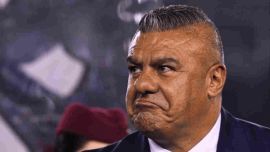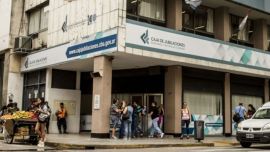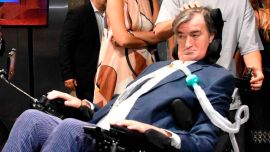Sergio Massa was not the top individual candidate. Nor could Unión por la Patria achieve its goal of clearing 30 percent. But this was already known by Argentina’s economy minister and the ruling coalition’s lead presidential hopeful himself 48 hours before voters headed to the polls. The numbers he had asked his team for in advance of the vote showed that the highest-ranking position would go to libertarian lawmaker Javier Milei.
After taking to the stage on Sunday night, he tried to put a positive spin on things. “Milei’s high percentage makes Juntos por el Cambio vie for votes with him to see who gets to the run-off. If we had been first, everyone would be pointing at the government, but now this gives us political time,” he said, justifying the challenging numbers that led Peronism to a historic defeat.
The presidential hopeful had started to receive early results at 6pm on Sunday. As the day drew to a close, he barely had over 20 percent of the vote. Mayors were warning him what his observers were finding when opening the ballot boxes, as did governors. Preliminary results in some districts were catastrophic. Massa went from his home to the ruling coalition’s bunker already knowing he would not show up on stage heralding a victory, a promise he had made to Vice-President Cristina Fernández de Kirchner and the coalition’s leaders when debating whether to run in the PASO primary.
The murder of 11-year-old Morena Domínguez after being mugged by thieves on a motorbike in Lanús shook the ruling party, which had to suspend its campaign and halt its strategy for the final few days aimed at undecided voters. After hours of silence, Massa decided to speak and deliver a final message. As analysed from the official bunker, what happened “could lead voters either to rage or to finding a solution” – with the emergence of the results, the choice was clear: it led to a protest vote.
Away from the capital, Kirchnerism could find relief in Buenos Aires Province. Seeking re-election, Governor Axel Kicillof ended up finishing five points ahead of Juntos por el Cambio, which must now fight to retain all its votes.
Massa himself set the tone of his speech and of the day after: they did not have to be defeatist, but competitive, and with the possibility of a good general election that could still take them into a run-off.
But Massa’s main problem is not as a candidate, but as an economy minister. He already knew that, which is why last Friday he asked officials to put together a post-election package and to prepare themselves to contain the currency.
However, the announcements they anticipated prior to the curfew now seem to fall short. More international financing, measures to speed up imports, a new bidding for the Reserva del Norte gas pipeline, and discussing a 2024 Budget with zero deficit.
The question is also how this result will affect the Unión por la Patria primary. Massa managed to unite irreconcilable positions, such as those held by President Alberto Fernández and Vice-President Cristina Fernández de Kirchner – as long as there was a triumph. Now they must aim for the general election that is still two months away.
It was a dark and disappointing night for Massa. He barely scratched the surface of the 20-percent mark, and according to initial results, he was even losing the election at his stronghold. In Tigre, Mayor Julio Zamora got the most votes, ahead of Malena Galmarini, Massa’s wife.
Massa’s reaction will be key, not only if Unión por la Patria is to stand any chance against such extreme candidates as Milei and Patricia Bullrich, but also in terms of the governability of an administration that has four months to go.




















Comments